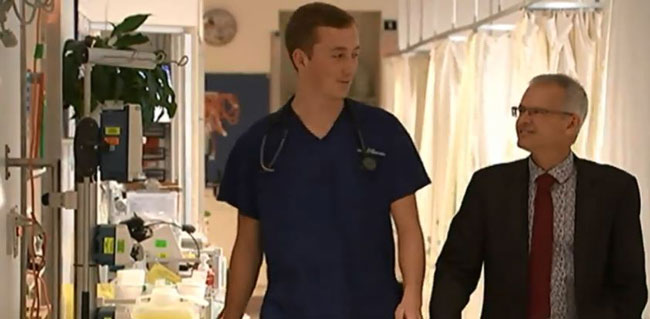 Tuesday 27 February 2018 11:52am
Tuesday 27 February 2018 11:52am
Second-year medical student George Watson and Canterbury DHB cardiologist Paul Bridgman at the Christchurch Hospital cardiology ward. Photo: One News.
A University of Otago, Christchurch, summer student has identified the days when patients are most vulnerable to dying from a 'broken heart'.
Broken heart syndrome or stress cardiomyopathy is a relatively rare condition that mimics symptoms of coronary heart disease. After the Canterbury and Kaikoura quakes, higher rates of patients presented with the disorder – giving researchers a unique chance to study it.
Second-year medical student George Watson interviewed 11 people who suffered 'broken heart syndrome' after the earthquakes. The interviews were for his Summer Studentship programme project, where medical or science students get the chance to take part in a real research project. They are supervised by clinicians and senior researchers over a 10-week period.
Watson found while patients felt worst on the first day the syndrome hits, they were more likely to die from arrhythmia on the following two days. Watson says these 'most fatal' days were often when patients reported feeling better and their blood tests were returning to normal.
Canterbury DHB cardiologist Paul Bridgman was one of Watson's supervisors. He says the findings provide scientific evidence on a condition that has become more common in the past decade. In Canterbury, there has been a 10 per cent increase in patients in last 10 years, or about one patient a week now. Bridgman says most patients in hospital survive the condition but not everyone. Patients in the community not receiving medical care were also of concern, he says.
The quality of Watson's project was so high, and findings so immediately beneficial to patients that he won the overall award for best Summer Studentship project, beating out more than 50 other students.
For more information, contact:
Kim Thomas
University of Otago, Christchurch
Communications Manager
Phone: 027 222 6016
Email: kim.thomas@otago.ac.nz
A list of Otago experts available for media comment is available elsewhere on this website.
Electronic addresses (including email accounts, instant messaging services, or telephone accounts) published on this page are for the sole purpose of contact with the individuals concerned, in their capacity as officers, employees or students of the University of Otago, or their respective organisation. Publication of any such electronic address is not to be taken as consent to receive unsolicited commercial electronic messages by the address holder.